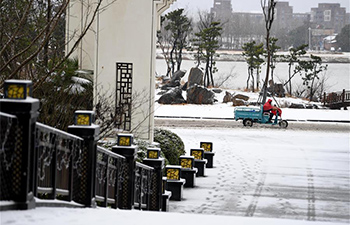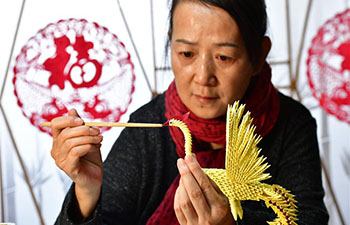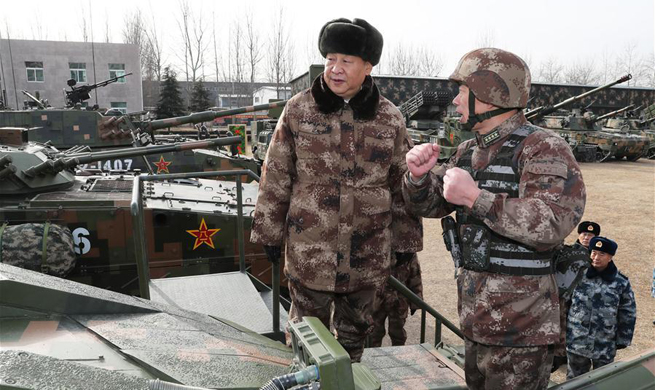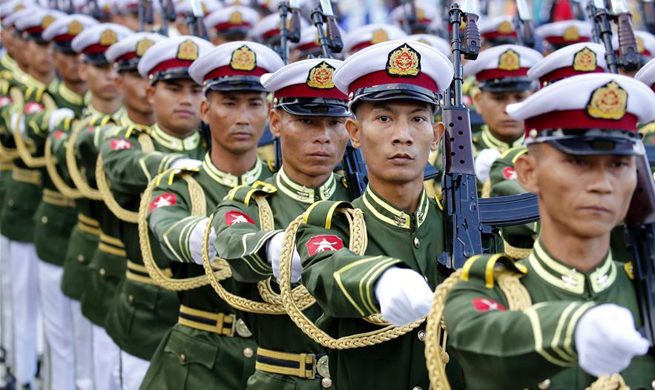BERLIN, Jan. 4 (Xinhua) -- Senior party figures in the Christian Social Union (CSU) have urged the German Social Democrats (SPD) on Thursday to remain modest with their demands during upcoming coalition negotiations.
CSU parliamentary faction leader Alexander Dobrindt told the newspaper "Bild" that the Social Democrats had to decide "whether they wanted to assume responsibility and accept the electoral result."
"However, this cannot mean that a 20-percent-party achieves 100 percent of its goals," Dobrindt added.
Official discussions over a re-launch of the "grand coalition" between the Christian Democratic Union (CDU), CSU and SPD are scheduled for Jan. 7. The CSU wants to formulate the conditions under which it will join a prospective new government by Saturday, but earlier reports that these will include cutting social benefits for refugees have already caused a row between the party and the SPD.
Speaking to "Bild" on the sidelines of the CSU's ongoing winter party conference in a Bavarian monastery, Dobrindt defended the party's tough stance on migration. He noted that "even the Greens" had accepted the joint CDU/CSU concept proposed in the policy area during previous "Jamaica" coalition negotiations. Saying that the plans included a special hardship clause demanded by the SPD, Dobrindt stressed that his party was unwilling to alter its position again.
Similarly, CSU secretary general Andreas Scheuer announced that his party would offer no further concessions and insist on limiting the inflow of refugees.
"We will not retreat beyond the lines drawn during Jamaica coalitions, including for immigration," Scheuer told the public broadcaster "ZDF".
In spite of such bellicose rhetoric, CSU party leader Horst Seehofer vowed to do everything in his power to ensure the successful formation of a new German government with the CDU and SPD.
"This project can succeed if the potential coalition partner refrains from exaggeration," Seehofer said.
Although SPD leader Martin Schulz has recently clashed with the CSU over their visions for the future of Europe, he still expressed confidence that there was a "solid foundation" on which another "grand coalition" could be built.
Previous high-level talks between the leadership of the CDU, CSU and SPD had been "very concentrated and goal-oriented", Schulz said.
The SPD leader's optimism was echoed by Dobrindt, who told "Bild" that "trust had grown" between the prospective coalition partners.
According to the magazine "SPIEGEL", the CDU, CSU and SPD have agreed to impose a news embargo on the development of coalition talks. They hereby hope to prevent that spiralling public disputes and incriminations lead to an unravelling of negotiations, as occurred during the unsuccessful "Jamaica" talks.
"SPIEGEL" further reported on Thursday that the parties want to reach a mutually-acceptable solution concerning the national use of the pesticide Glyphosate as a matter of priority. Minister for Agriculture Christian Schmidt (CSU) recently voted to support the extension of Glyphosate's license in the EU without coordinating his position with German Chancellor Angela Merkel (CDU) and the Minister for the Environment Barbara Hendricks (SPD).
Schmidt's controversial decision created significant tensions within the acting cabinet and has therefore been seen as posing a potential stumbling block to successful coalition negotiations.

















